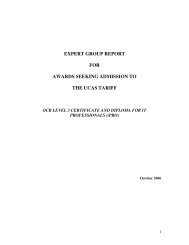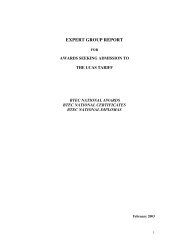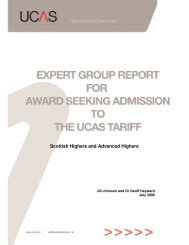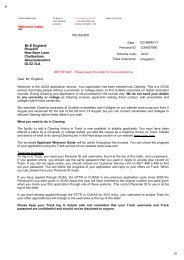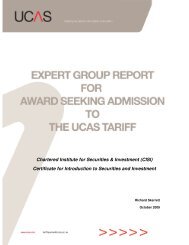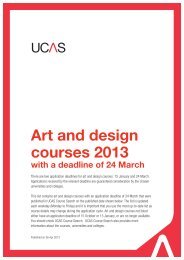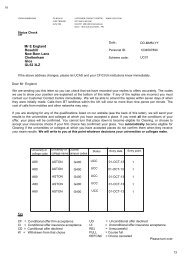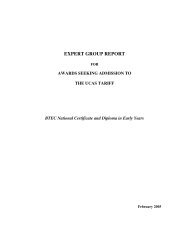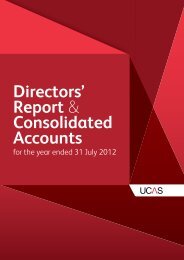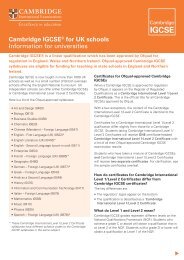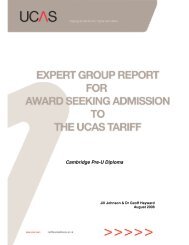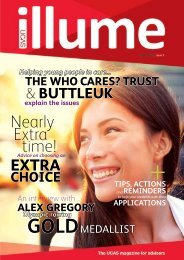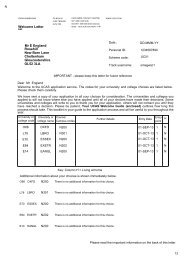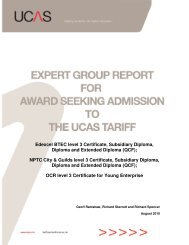International qualifications 2013 (pdf) - CUKAS
International qualifications 2013 (pdf) - CUKAS
International qualifications 2013 (pdf) - CUKAS
You also want an ePaper? Increase the reach of your titles
YUMPU automatically turns print PDFs into web optimized ePapers that Google loves.
Appendix C – <strong>International</strong> Baccalaureate middle years programme, certificate and diploma<br />
The IB Diploma Programme is recognised by Ofqual as an<br />
accredited qualification. The IB is recognised by UK HEIs as<br />
fulfilling the minimum matriculation requirements for entry. The<br />
IB recommends that institutions make offers to applicants<br />
based on a total points acquisition by the candidate. Offers to<br />
IB students that are expressed in terms of gaining the Diploma<br />
and with specific grades, usually in HL subjects, should not be<br />
made by equating IB grades to GCE A level grades. No formal<br />
equivalence exercise has been conducted on IB higher level<br />
courses and A levels, therefore it is not possible to make<br />
comparisons on the basis of any external evidence. This<br />
approach also does not take account of, and give credit to, the<br />
breadth of study required in the IB Diploma Programme.<br />
The IB Diploma Programme has been awarded the following<br />
UCAS Tariff points.<br />
Grade<br />
UCAS Tariff points<br />
(2010 onwards)<br />
45 720<br />
44 698<br />
43 676<br />
42 654<br />
41 632<br />
40 611<br />
39 589<br />
38 567<br />
37 545<br />
36 523<br />
35 501<br />
34 479<br />
33 457<br />
32 435<br />
31 413<br />
30 392<br />
29 370<br />
28 348<br />
27 326<br />
26 304<br />
25 282<br />
24 260<br />
<strong>International</strong> Baccalaureate (IB) Course*<br />
Higher Level Standard Level Core requirements*<br />
Grade Tariff Grade Tariff Grade Tariff<br />
points points points<br />
7 130 7 70 3 120<br />
6 110 6 59 2 80<br />
5 80 5 43 1 40<br />
4 50 4 27 0 10<br />
3 20 3 11<br />
*Points for IB Courses came into effect for entry into higher<br />
education from 2010 onwards.<br />
**Students who register for an IB Diploma but do not successfully<br />
complete all elements can achieve UCAS Tariff points from their<br />
achievement in individual courses and the core requirements of<br />
the Diploma curriculum (extended essay, theory of knowledge<br />
(TOK) and creativity, action, service (CAS).<br />
Students who register for individual IB Certificates rather than the<br />
IB Diploma cannot collect Tariff points from the core.<br />
IB CAREER-RELATED CERTIFICATE<br />
Qualification Abbreviation:<br />
IBCC<br />
National <strong>qualifications</strong> framework level:<br />
Level 3<br />
Background:<br />
The IBCC (<strong>International</strong> Baccalaureate Career-related<br />
Certificate) is an IB programme, designed to be taken over two<br />
years, and to complement career-related/vocational courses. It<br />
is the school’s responsibility to determine the appropriate<br />
career-related/vocational course that is linked to the IBCC, and<br />
should be determined by the local context and aligned with<br />
student needs, whether they are used to support further<br />
studies or to assist direct employment opportunities. The IB is<br />
not responsible for the choice and administration of the careerrelated/vocational<br />
course offered to students; however, schools<br />
need to ensure that the course is recognised by local, national<br />
or international authorities, and that it is usually taken over a<br />
two-year period.<br />
The IBCC:<br />
g<br />
provides flexibility to allow for local differences<br />
g<br />
is relevant and creative<br />
g<br />
sets appropriate and achievable attainment requirements<br />
g<br />
encourages significant school and student input in the<br />
curriculum and assessment<br />
g<br />
provides breadth and balance.<br />
Date of first award:<br />
May 2009<br />
Number of units/structure:<br />
The IBCC is a framework that consists of three key elements:<br />
1. Candidates choose a minimum of two IB Diploma<br />
Programme courses from any of the six Diploma groups,<br />
at Higher Level (HL), Standard Level (SL) or a combination<br />
of both.<br />
2. In addition to the Diploma courses requirements, students<br />
must also complete the IBCC core which consists of an<br />
internally assessed Approaches to Learning course and<br />
Community and Service programme, as well as an<br />
internally assessed and externally moderated Reflective<br />
Project. Students must also complete a language<br />
development course relevant to their needs.<br />
3. The above requirements must all be studied concurrent<br />
with a career-related course of study.<br />
Assessment method:<br />
With regard to the Diploma courses, assessment in the IB<br />
varies widely across the disciplines and includes externally<br />
assessed multiple choice, essay, data analysis, short answer<br />
and structured questions. In most subjects the teachers<br />
contribute more than 20% of the marks through internal<br />
assessment which is then moderated by external examiners.<br />
Students are assessed on the whole course in final<br />
examinations held at the end of the two years. The courses are<br />
not modular. Assessment procedures are kept constantly under<br />
review to ensure both integrity and quality. Their validation<br />
includes, amongst other activities, question paper and marking<br />
scheme review by external advisers, standardisation of<br />
examiners, marking, moderation, grade awarding and<br />
arbitration procedures, an enquiry upon results service, and<br />
public reporting of statistics.<br />
The Approaches to Learning and Community and Services<br />
aspects of the IBCC are internally assessed and can take the<br />
form of either formative or summative assessment. The<br />
Reflective Project is internally assessed and externally<br />
INTERNATIONAL QUALIFICATIONS 81



